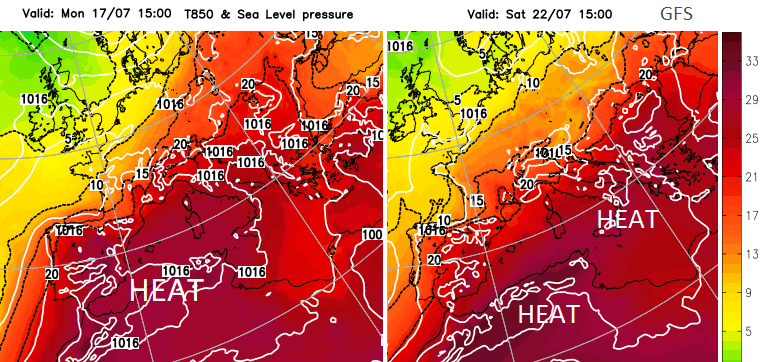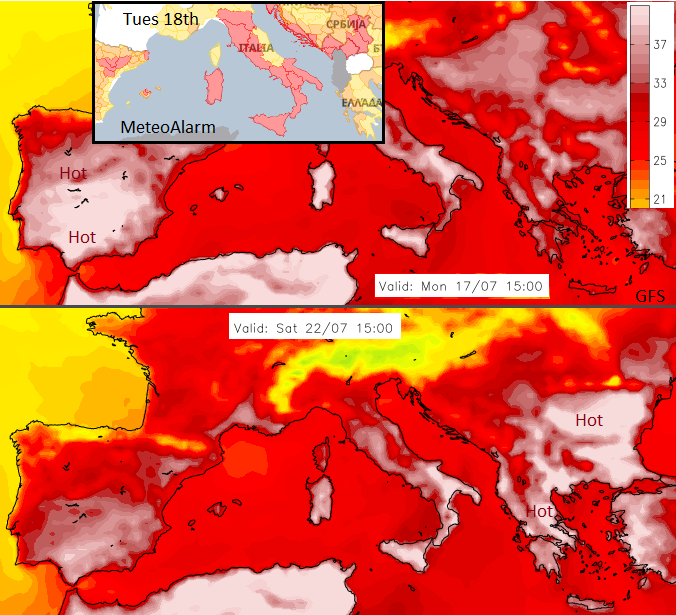
Heatwave conditions continue this week for southern Europe and northern Africa including Tunisia. Anyone due to travel to these regions will be reading the headlines and wondering what on earth the heat is going to be like. The highest UK temperature on record was 40.3C in Lincolnshire, around this time last year. Temperatures in southern Europe have already been surpassing that value. There will be another intensification during this week with the focus of the heat edging towards the eastern end of the Mediterranean and southeast Europe by next weekend. The week starts with red high temperatures warnings in Spain, Italy and the Balkan states. Greece and Turkey will join the central Mediterranean in seeing temperatures in the high 30s and 40s Celsius as the intense heat spreads and builds.

Temperatures overnight will remain in the 20s Celsius, tropical nights that add to the heat stress on people as the heatwave keeps on going. A High pressure setup has led to a heat dome situation over northwest Africa and the Med. The heat just builds and builds then is guided up to Iberia or Italy and later this week, towards Greece. Extreme temperatures come about after days of intense heat, with more sunshine, light winds as the ground and air just gets hotter and hotter with little respite overnight.

It is this ongoing oppressive heat that can be deadly and why there are so many warnings. It is not just ordinary summer heat.
In a report published this month, Santé Publique France (SPF the French public health agency) estimated that heat was responsible for between 1,000 and 7,000 deaths annually. Looking at the third of a year period, from June 1 and September 15, SPF said that nearly 33,000 deaths were caused by hot weather since 2014.
"Heat waves are extreme weather events that have the greatest impact on all age groups in the population," said Sébastien Denys, SPF's health-environment-work director.
Not all were within heatwave conditions. People, especially the elderly, often adapted their behaviour significantly in very severe weather but remained vulnerable and perhaps take more risks during other hot times. Those on medication would be medicated to a level that represented their usual everyday life, not a level where they were having to cope with the excess strain of high temperatures. Hot weather adds another layer of stress on people’s bodies. Some people can cope, some adjust their activities, for others, it becomes too much.
It is thought that the 2003 European heatwave caused over 70,000 deaths in Europe with over 14,000 excess deaths in France due to the heat, particularly in elderly and isolated people. It led to a national plan of action for future heatwaves being drawn up in 2004, as our global changing climate is only going to bring more of these events. Portugal and Switzerland saw their highest-ever recorded temperatures in August that year.
The 2017 heatwave hit SE France, Italy and Croatia in August. Italy saw a huge surge in in emergency hospital admissions as temperatures stayed above 30C for three days and three nights. This heatwave became unofficially known as Lucifer, from the Latin for light bringer- the Morning star, Venus but in this case the Christian name for the devil. This name has stuck and more heatwave names are popping up this year.
There have been various unofficial names bandied about. Cerberus (the hound of hell, a multi-headed dog that guarded the gates of the Underworld), in Seville they have their own name “Xenia”, Cleon (a seemingly badly behaved ancient Athenian statesman) and Charon for this week’s resurrection of last week’s heat. Which seems a bit excessive to give another name this month referencing the Greek mythology grim ferryman of the dead who transported the ghosts of the dead to Hades. It’s all very dramatic. Like the European 'Name our Storms' saga for impactful low pressures, there are positives and negatives to naming these events or synoptic features. It has been the Italian weather company Il Meteo who have been chucking out the names for large anticyclones in the Mediterranean and word is spreading like wildfire. Some people think names trivialise extreme weather events, others think it is a great communications tool and a good way of getting across the severe weather message. As with the storm naming, it all seems a bit chaotic and random at the moment.
The current official European record high temperature is 48.0C in Athens in July 1977. In July 2021, 48.8C was reported in Syracuse, Sicily but has not been verified by the WMO yet. Temperatures are forecast to reach the mid-40s C this week in southern Europe. Inland Sardinia will see relentless heat and could produce one of the highest temperatures of this event.
Central Italy including Rome, Sardinia and Sicily have been seeing intense heatwave conditions in the past week with more to come. Temperatures have been in the mid to high 30s Celsius with some cities expected to reach 40+C midweek. Inland hotspots have already seen high than that with the mid-40sC possible on Tuesday. It is dry, sunny with very light winds. There has been a lack of rainfall and drought conditions for parts of Italy for months and central Mediterranean countries to be the focus for the current summer heatwave hitting southern Europe.
The official Met. Service in Italy comes from the military, the Italian air force. They were not going to be the ones naming heatwaves with names from ancient Greece.
Portugal has been on the edge of the ferocious heat. Lisbon and the west coast of the Algarve remain in the high 20sC this week but further east, including Faro, temperatures are higher. There is a yellow heat warning for much of the southern region, perhaps reaching 35C by Thursday and staying in the 30s.
To start the week there are many high temperature warnings with orange warnings across central and southern inland Spain. There are three red alerts on Monday for northern Andalucía and mention of 44C. By Tuesday the focus of the heat alerts is further northeast with Aragon and Catalonia seeing red warnings. So very hot for the Costa Bravas with Figueres, slightly inland, into the mid 40sC. Mallorca (Majorca) also has a red warning with up to 43C forecast in the north, including inland Alcudia Bay. 35C for the coast and for 39C for Palma including the airport but less intense heat by next weekend although still at 34C. Ibiza will be hot and sunny with temperatures in the mid-30s Celsius and very high UV levels.
Canary Islands aren’t seeing this heat but wildfire issues continue on the western island of La Palma. People have been evacuated and sent to shelters, although some have now returned and some roads re-opened. There is thick smoke in the air with ongoing fires and soldiers deployed to help the firefighters. Gran Canaria is also now affected.
Nordic countries and the Baltic States produce Forest Fire warnings which are available on Meteo Alarm. To start the week they are showing over Finland, Norway, Latvia, Lithuania and Czechia.
It is southern France which is experiencing the heat with a cold front across the country bringing the risk of severe thunderstorms and torrential downpours. Northern France is in the same fresher air as the UK. The Pyrenees are highlighted as seeing extreme temperatures on Tuesday and for the Maritime Alps, very warm nights and daytime temperatures of 32 to 38C. For Nice, it will be 28 or 29C by day but up to 30C by the weekend and very warm by night. Corsica could reach 40C
"Persistent episode of heat in the south-east of the country with a marked peak on Tuesday. Phenomenon, not exceptional, but requiring particular vigilance, especially for people who are sensitive or exposed due to its duration." Meteo France
Greece continues with heat warnings but it is expected to become hotter by the end of this week. This heatwave is being called Cleon in some areas. Meltemia (or Etesian) seasonal winds from the north are helping bring the highest temperatures down slightly for the start of the week. However, Friday and the weekend are being highlighted as seeing a return to the ferocious heat by the Hellenic National Met. Service HNMS. Temperatures in the first half of the week will be mid-30s to 40C and then up another few degrees for the end of the week.
‘On Thursday 20th maximum temperature values e2808be2808bwill reach the mainland 40 to 42 and locally 43 degrees Celsius, the Ionian islands 39 to 41C and the Aegean islands 37 to 39 Celsius.’ HNMS
The Acropolis has been in the news, with temporary closures to protect tourists from the intense heat. The forecast shows temperatures rising from 37C to 40C in the afternoon heat later this week. Zakynthos is forecast to peak at 35C this week and staying at 27C overnight. Kos rising to 37C by the weekend from a very warm 34C to start the week.
This chart shows 7-day mean anomalies of 2 m temperature from the ECMWF extended range ensemble.
What if you have a holiday booked later in July or in August in the south of Europe? There seems to be a shift further south and eastwards of the heat for next week. So not as hot for Spain and Portugal, southern France and Alpine areas. Keep an eye on Meteo Alarm for the national Met. service warnings and respect the intensity of summer heat in these regions.
Loading recent activity...